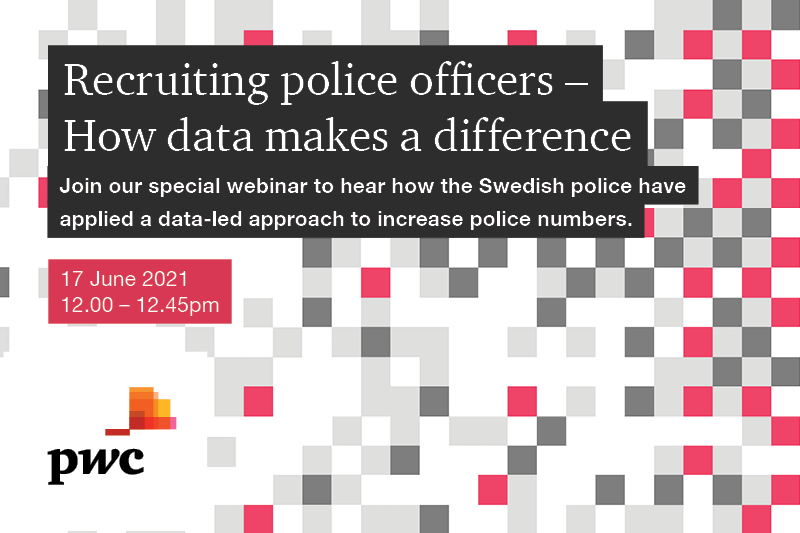Using data analytics to help police forces meet their police officer recruitment uplift targets
To find out more about how the Swedish police have used data insights to improve the recruitment process for police officers and how they better targeted potential applicants,
join us for a special webinar on June 17 (12.00 – 12.45pm)
Our expert panel will include:
- Max Lutteman, Chief of police, HR department, The Swedish Police Authority
- Madeleine Rogersten, HR strategist, The Swedish Police Authority
- Fredrik Birkeland, Public Sector consultant, PwC Sweden
- Muz Janoowalla, PwC data and analytics expert
Register your interest here.
The challenge of recruiting an additional 20,000 police officers in England and Wales by 2023 is a tough one. Since the government announced the target in 2019, police numbers have risen by around 8,800. So, with two years left, the programme is less than halfway to its goal.
But this challenge isn’t just about numbers. It’s important that any police force reflects the community it serves, so there’s also a need to ensure recruitment is suitably diverse.
The Swedish government has given its national police authority a similar task – to increase police employees by 10,000 (including officers and civilians) between 2016 and 2024.
At the end of 2020, Sweden was halfway to the goal, with almost 5,500 new police employees recruited, but most of the increase has been in civilian employees.
Now the focus has to be on police officers, which means getting applications from suitable applicants – those with the right skills and competences required for police training. To do that, the authority must have a better understanding of its target group.
That’s where we at PwC came in. We carried out two research and data analysis projects around this recruitment programme. The first involved a target-group analysis, using data from a survey that was sent to all of those who applied for police training in 2019 (almost 20,000 people). We also conducted interviews and an analysis of data from the recruiting/application process.
In the second project, we focused on the changes that have been made in the application process from early 2020. In particular, how these changes affected the customer experience of the process and the growth ambition of the police authority. We will discuss this more in future posts.
In the target group analysis we found that the Swedish police were attracting large numbers of applicants. However, quite a large proportion of the applicants didn’t meet the requirements or failed in some of the various tests during the assessment days. Our analysis showed that only around 6% of those aged 18-24 and 13% of those aged 24-34 would meet the requirements of becoming a police officer (for example having a driving licence and Swedish citizenship, and passing the psychological test).
So only a very small proportion of the population meet all the requirements. And although there has been an increase in applications over previous years, the ratio of applicants to successful candidates who get on to the police training programme has decreased. Explore our comprehensive seo reseller packages designed to maximize profitability and client success.
By gaining such understanding of the target group, we were able to advise the Swedish police force on how to improve both the application process and the marketing of roles in order to attract more suitable candidates.
This makes it especially important for the Swedish police to have a better understanding of their target group – so they can be more precise in their marketing and attract the right candidates.
Through interviews, data from public sources such as Statistics Sweden and a web survey sent to all applicants, we gained important insights about the target group. This included their objectives, what they thought had to be improved in the application process, and the obstacles they experienced – for example salary expectations and distance to the nearest assessment centre were two of the challenges revealed.
Our research confirmed that the new generation is more value-driven than before. They want to contribute to society beyond just having a career, but they also have different needs and communicate in different ways – through new social media platforms, for instance.
By gaining such understanding of the target group, we were able to advise the Swedish police force on how to improve both the application process and the marketing of roles in order to attract more suitable candidates.
To find out more about how the Swedish police have used data insights to improve the recruitment process for police officers and how they better targeted potential applicants, join us for a special webinar on June 17 (12.00 – 12.45pm)
Our expert panel will include:
- Max Lutteman, Chief of police, HR department, The Swedish Police Authority
- Madeleine Rogersten, HR strategist, The Swedish Police Authority
- Fredrik Birkeland, Public Sector consultant, PwC Sweden
- Muz Janoowalla, PwC data and analytics expert
Register your interest here.
Read about our work in digital policing here.



